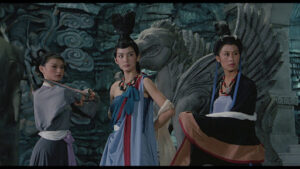Decisions of the Heart: Sacrifice in the Pursuit of What’s “Right”
Decisions of the Heart: Sacrifice in the Pursuit of What’s “Right”

- Wai Kei
Share this :
(This article contains spoilers)
“Were y’all sad when he broke the news that he wanted to move to Singapore?”
“Of course we were sad! Especially since he’s our little brother. But there were more opportunities for you guys there.”
This loosely translated Cantonese conversation with my aunt about my Dad unfolded between the two of us, in the middle of the first (and last) house my Dad ever bought in Hong Kong.
My eyes scan the room, lingering at certain spots. If walls could talk, I would have wanted them to reveal all the fearful yet exciting conversations my Dad’s young adult self must have had back then. I picture his feet pacing around within the four walls of this one-room flat — home to furniture and dreams, now left with peeling walls and bittersweet memories. It’s an immigrant storyline that’s become all too familiar: leave the family and place that shaped you, to nurture your own in another country.
Sacrifice and decision-making — we are familiar with these things. We make decisions every day. But since our lives are so interconnected, the decisions are not confined within a vacuum. Whether we want them to or not, our decisions have implications for those around us.
Characters in Zu: Warriors From The Magic Mountain (1983) face choosing what to save at the expense of losing something else. As the film progressed, I grew privy to the characters’ psyche and could not help but empathise with their anguish — not only when they made final, life-threatening choices, but even in the moments leading up to it.
As the film’s antagonist grows stronger, the Mistress is presented with a difficult dilemma: weighing the innocent lives of the people she leads against the greater good of society. It was not her warriors’ choice to get caught up in the fight against evil. They were simply at the wrong place, at the wrong time. Yet, given her position of authority, she had to make an urgent call then and there: accept the disappearance of her own warriors or risk chaos and havoc for the whole society.
At the time the film was made, 1980s Hong Kong was a melting pot of Eastern and Western cultures, with influences from British colonial rule seeping into Chinese traditions. Hence, despite being a primarily Asian film, it is interesting to note Zu’s Western influences: it was helmed by Hong Kong director Tsui Hark, who consulted Western special effects experts, like Peter Kuran (The Thing, 1982) and Robert Blalack (Star Wars, 1977).
Delving beyond the production process, western influences could be observed in the film’s narrative too. The active decision to sacrifice one for many is prevalent in many of Zu’s characters’ decision-making as they sacrifice themselves and even each other for the sake of humanity, an attitude borrowed from Western cultures. This subverts the common Eastern mindset to not intervene with issues and instead, let fate take its course (Awad et al., 2020).

It’s hard enough to make decisions on your own that not only implicates yourself and others, how about making decisions for someone else?
After energetic fight and flight sequences elevated by wireworks, Master Ding is on the verge of complete possession by the Blood Devil, accomplished through compositing. He eventually caves into the mindset that prevention is better than cure. In an emotional speech, he instructs his disciple and our protagonist Dik to “place justice over loyalty” and kill him before the rest of society is in danger. We are not privy to Dik’s train of thought but if I were him, my brain would probably sound something like this:
He knows best right?I should listen to him and kill him. Kill him… but how can I kill my own very teacher, even if it’s for the sake of society? Yes, he’s going mad, it hurts me to see him spiral right before my very eyes.Should I put him out of his misery? There’s not a lot of time left before he goes completely rogue. But what if there’s a chance of recovery for him? I don’t want to be responsible for nor guilty of reducing those chances to zero.
Can Dik fault himself for disobeying his teacher’s orders? Can we blame him for the dilemma?
On a self-sacrificial level, the Mistress tries her best to heal a possessed Master Ding. Yet, his rapidly deteriorating health is no match for her healing powers. Although she fails to receive anything in return, she pushes through anyway, despite having only just met him.
Of course, acts of sacrifice are not always subject to the film’s level of dramatic flair and magical elements, especially in our daily lives. Bringing this closer to home, I think back on the people in my life who carry the same dedication: I taste the warm soup soothing my throat and nourishing my soul, the soup that my mum saves in a thermal flask when I come home past midnight; I watch the red ink from my teachers’ pens scurry across the pieces of scrap paper they use to help me understand troubling concepts; I feel the gentle touch of hands from my friends who hold the space for me to hear my woes.
Despite all of Zu’s artifice, from being set in an unknown space and time to special effects at their infancy, the hefty weight of all the characters’ circumstances and emotions are still very authentic. They grapple with human consequences and choices that gives the film a timeless and relatable element to us mortals with no superpowers nor supernatural skills.
I will never know all the sacrifices and onerous decisions my Dad made for my life to be what it is today. What I do know is that I feel it. I feel his sacrifices and the sacrifices of those who came before him. And now, it is my turn to make those sacrifices to lead the best possible life I can for myself and my loved ones.
About the Author
Wai Kei is a Final Year Communication Studies undergraduate. Instead of outgrowing cartoons, her interest only grew into a deep passion for analysing animated films and TV series. When she is not dancing, she explores topics about children’s media, mental health and culture.
References
- Awad, E., Dsouza, S., Shariff, A., Iyad, R., & Jean-François, B. (2020). Psychological and Cognitive Sciences. Universals and Variations in Moral Decisions Made in 42 Countries by 70,000 Participants, 117(5). https://www.pnas.org/doi/10.1073/pnas.1911517117
Share this :
